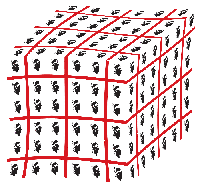Speaker
Takashi Inoue
(Nihon University, College of Bioresource Sciences)
Description
We report our recent study of the baryon-baryon interactions from lattice QCD.
In the flavor SU(3) limit, two octet-baryon states are labeled by
six flavor irreducible multiplet. In particular for the S-wave,
there are flavor 27-plet, octet and singlet for spin singlet states(1S_0),
and flavor anti-decuplet, decuplet and octet for spin triplet states(3S_1).
These states provide convenient basis for two octet-baryon system in S-wave,
where the interaction matrix becomes diagonal.
We have extracted potentials of the interaction following the method recently
developed (N. Ishii,S. Aoki and T. Hatsuda, Phys. Rev. Lett. 99, 022001 (2007)).
We've found strong flavor dependence of the interaction in that basis.
For example, the spin-singlet flavor-octet channel has a very strong repulsion
at short distance while the spin-triplet flavor-octet channel has a very weak one.
Moreover, it turns out that the spin-singlet flavor-singlet state
has no repulsion at short distance but an attraction instead.
It is interesting that quark models had predicted these features correctly.
This provides us important information about physical origin of the
baryon-baryon interaction.
Our numerical results are obtained from full QCD gauge configurations
in the flavor SU(3) limit corresponding to a pion mass of 834 MeV,
provided by CP-PACS/JLQCD Collaborations to Japan Lattice Data
Grid(JLDG)/International Lattice Data Grid(ILDG).
| Please, insert your presentation type (talk, poster) | talk |
|---|
Author
Takashi Inoue
(Nihon University, College of Bioresource Sciences)

